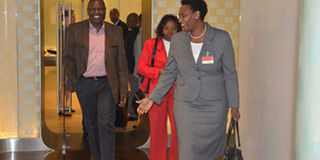Breaking News: At least 10 feared to have drowned in Makueni river
Hague cases offer us time to reflect on the Kenya we have

Kenya's Deputy President William Ruto is welcomed to Schipol Airport by the country's ambassador to Netherlands, Mrs Makena Muchiri, when he attended a Status Conference at the International Criminal Court (ICC) in Hague. PHOTO| FILE
What you need to know:
- Opportunities to learn lessons from similar tragedies have been spurned in the past. Inquiries into the violence of the 1990s, for instance, offered valuable insights for anyone interested in preventing recurrences of the clashes around the 1992 and 1997 polls.
All court cases lose sight of the big picture. Obsessed with procedure and the minutiae of a case, courts become highly focused on individual defendants in an effort to determine responsibility for a crime.
This narrow field of vision often means the wider context in which the accused operated and their alleged victims can be all too easily overlooked.
This suits the defendants in the ICC cases. Ever since their names were first listed on the sheet of paper passed to Kofi Annan by the Waki committee, the accused have mounted a skilful PR campaign intended to depict the allegations levelled against them as a personal political vendetta.
One does not need to be supporter of President Uhuru Kenyatta or his deputy William Ruto to admire the skill they and their British consultants have exhibited.
By convincing voters to conflate the defence’s case with Kenya’s national interest, the two men salvaged their political careers.
But those who bemoan the ability of the President and his deputy to make their personal interests seem to be matters of national concern should also turn their ire to their opponents.
Their opponents have failed to marshal the significant popular support for the ICC cases suggested by numerous opinion polls. The contrast between the politicians and the civil society activists could not be more stark. Champions of human rights in various civil society organisations - now disgracefully labelled as neo-colonial lackeys - have spent the past five years courageously and consistently setting out the reasons for support of the ICC process.
Instead of following the activists’ lead, Mr Raila Odinga and his fellow Cord leaders have floundered on the issue. Outsmarted at every turn, they are still left reeling by every new development. The party line should be simple; the rule of law, justice for the victims of the post-election violence and the past preference of the supporters of the accused to fight their case at The Hague rather than in a local tribunal demand that support for the cases continues as long as the charges stand. And those same principles also mean that the dismissal of charges or a not guilty verdict be treated as an unequivocal declaration of innocence of the accused.
Kenyan supporters of the ICC have not been helped by the court itself.
The barrage of criticism of the court and its prosecutors has not been met with any meaningful response from The Hague. Western diplomats attempted to fill the vacuum but were all too easily outmanoeuvred by accusations of imperialist interference in Kenya’s domestic affairs.
Foreign diplomats and local politicians have both therefore failed to seize the momentum in the war of words between champions and critics of the ICC cases.
They have been unable to disentangle Kenya’s interests from those of the accused. But they will continue to try and the ICC’s detractors will continue to shout back at them about sovereignty, democracy and stability. But, in truth, the time for speaking has ended. It is now time to listen.
Whatever one thinks of the ICC as an institution or the specific cases against the accused, the next few months and years offer an unparalleled opportunity to reflect on the Kenya we have.
Hidden beneath the arguments about procedure and the emphasis of reporting on the defendants will be much insight into how the 2007-8 violence came to happen.
High price paid for disregard
Opportunities to learn lessons from similar tragedies have been spurned in the past. Inquiries into the violence of the 1990s, for instance, offered valuable insights for anyone interested in preventing recurrences of the clashes around the 1992 and 1997 polls.
A high price was paid in 2007-8 for this disregard. One needs only to think about the fate of the Ndung’u and, more recently, the TJRC reports to find other similar examples of wilful amnesia.
The surest way to squander the opportunity for reflection provided by the ICC this time is to think of the cases only in terms of Kenyatta and Ruto.
Both cases are bigger than these two men. If we choose to look deep enough, the cases are about 50 years or more of our history. They are about complex and difficult social relations, about the nature of the state and about the relationship between violence and politics.
In short, the cases can help us understand how we came to the tragic final days of 2007 and the first few months of the following year. But, most of all, they are about the thousands of victims of the post-election violence.
Political considerations have blocked prosecutions at home and so survivors and relatives of those who died have to look outside the country for justice.
No one pretends that the ICC is perfect, but it is all the victims of the post-election violence have. It is time to give them their day in court.





